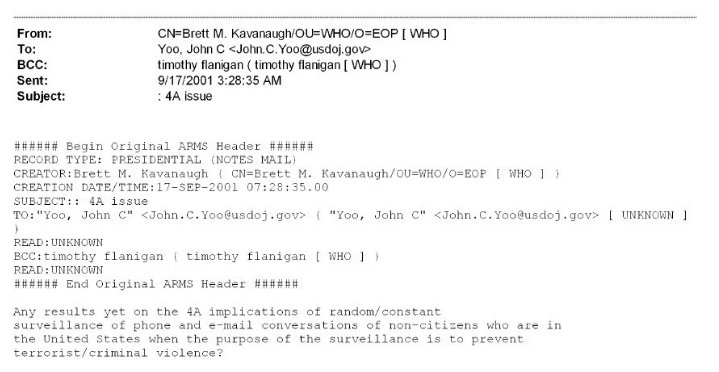THREAD. "Perjury" claims against Judge Brett Kavanaugh re: NSA surveillance.
1. I've done long threads on claims that Kavanaugh "perjured" himself re: Pryor & #Memogate. This thread will be shorter. #SCOTUS #KavanaghHearing #KavanaughConfirmationHearings
1. I've done long threads on claims that Kavanaugh "perjured" himself re: Pryor & #Memogate. This thread will be shorter. #SCOTUS #KavanaghHearing #KavanaughConfirmationHearings
2. Those two prior threads were long not because the claims have any merit, but just because I tried to go through all the evidence in methodical fashion.
Thread #1 (Pryor):
Thread #2 (Memogate):
Thread #1 (Pryor):
https://twitter.com/DavidLat/status/1037818136349814784
Thread #2 (Memogate):
https://twitter.com/DavidLat/status/1037928034224033792
3. The shortest refutation of the NSA claim: read the last ten (10) paragraphs of this article by @Charlie_Savage of @NYTimes - which is a news article, not an opinion piece, from a publication that's far from pro-Kavanaugh. The End. nyti.ms/2Ctpfak
4. Still here? Okay, if you're not behind the @NYTimes paywall or too lazy to read ten paragraphs, here's a longer version.
5. At Kavanaugh's 2006 confirmation hearing, @SenatorLeahy asked whether Kavanaugh had seen, in his role as @WhiteHouse Staff Secretary, docs about "the president’s N.S.A. warrantless wiretapping program.” Transcript: bit.ly/2MWxm4p.
6. Kavanaugh: "Senator, I learned of that program when there was a New York Times story." The program, code-named "Stellarwind," was revealed by @NYTimes in 12/05: nyti.ms/2QaVoX8.
7. Citing this 9/17/01 email from Kavanaugh to John Yoo, asking about results of research into the 4th Amendment and surveillance, @SenatorLeahy argues that Kavanaugh's 2006 testimony was false: 

8. What was the 9/17/01 email about? Per the Times, it related to a 9/17/01 memo by Jonn Yoo to Timothy Flanagan, then deputy @WhiteHouse counsel, entitled "Constitutional Standards on Random Electronic Surveillance for Counter-Terrorism Purposes."
9. The 9/17/01 Yoo-to-Flanagan memo and the 9/17/01 Kavanaugh-to-Yoo email, per the Times (but emphasis mine), "explored a HYPOTHETICAL warrantless surveillance program" -- i.e., NOT the subsequent actual program, Stellarwind.
10. Yes, some of the 9/17/01 research eventually made its way into #Stellarwind authorization -- but Kavanaugh wasn't privy to that, since he was no longer in the loop at that point.
11. Why? Because as Yoo explained to @NYTimes, “Kavanaugh was not cleared to know about Stellarwind or any other counterterrorism surveillance program that I worked on while at @TheJusticeDept." nyti.ms/2Ctpfak
12. See also @Neal_Katyal (liberal lawyer and former Acting Solicitor General under President Obama): "Leahy suggesting J. Kavanaugh knew about NSA wiretapping earlier than he testified in 2006 that he did. This is going to be easy to verify."
13. Why? Per Katyal: "There is always a record of everyone read into highly classified SCI programs & you even have to sign a ledger."
https://twitter.com/neal_katyal/status/1037364512901554177
14. As already noted, Kavanaugh was not "read into" Stellarwind, and his signature does not appear in the ledger. His 2006 testimony was accurate; he did not see "docs about 'the president’s N.S.A. warrantless wiretapping program'" prior to the Times story.
15. One other point, made by @RajShah45 this week: the 2006 questions related to what docs Kavanaugh had seen "as staff secretary,” a role Kavanaugh didn't assume until 2003 - i.e., well after the 9/17/01 email and memo traffic.
16. What about Kavanaugh's latest testimony, in his #SCOTUS confirmation hearings? This week, @SenatorLeahy posed different, more general questions.
17. This time around, @SenatorLeahy pressed Kavanaugh "to say whether he had ever raised questions 'about the constitutional implications of a warrantless surveillance program' with Mr. Yoo in 2001," per @NYTimes. nyti.ms/2Ctpfak
18. Kavanaugh said that "he could not 'rule anything out like that,' allowing that in the early days after [9/11], White House lawyers worked on many things before regular assignments were sorted out. But, he said, his answer in 2006 was about [Stellarwind]."
19. So Kavanaugh's 2006 testimony was accurate; he didn't see Stellarwind docs because he wasn't authorized to do so. When asked a broader question this week about whether he had discussed surveillance more generally, he said he "couldn't rule it out."
20. Far from constituting "perjury," Judge Brett Kavanaugh's testimony about NSA warrantless wiretapping/surveillance, in both 2006 and 2018, was truthful, accurate, and complete. #SCOTUS #KavanaughHearings #KavanaughConfirmationHearings
• • •
Missing some Tweet in this thread? You can try to
force a refresh




